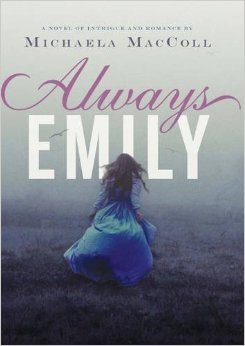 “ALWAYS EMILY,” by Michaela MacColl, Chronicle, April 8, 2014, Hardcover, $16.99 (ages 12 and up)
“ALWAYS EMILY,” by Michaela MacColl, Chronicle, April 8, 2014, Hardcover, $16.99 (ages 12 and up)
I’ve worn out at least one copy of “Jane Eyre,” possibly two. There’s something about Charlotte Bronte’s gothic novel that has always stuck a chord with me. The same cannot be said for Emily Bronte’s “Wuthering Heights.” I never could get into it. Perhaps it was Charlotte’s structure versus Emily’s seemingly wildness. Perhaps that’s why I was drawn to Michaela MacColl’s “Always Emily,” in which those two character traits play a large role.
Emily and Charlotte Brontë are about as opposite as two sisters can be. Charlotte is practical and cautious; Emily is headstrong and imaginative. But they do have one thing in common: a love of writing. This shared passion will lead them to be two of the first published female novelists and authors of several enduring works of classic literature. But they’re not there yet. First, they have to figure out if there is a connection between a string of local burglaries, rumors that a neighbor’s death may not have been accidental, and the appearance on the moors of a mysterious and handsome stranger. The girls have a lot of knots to untangle— before someone else gets killed.*
“Always Emily” brings the Bronte sisters to life. And truth be told, I like Emily as a person (at least how she’s depicted here) much better than Charlotte. That’s what’s so fun about this novel. MacColl has crafted the sisters based on what is historically known about them and then imagined them in the midst of a mystery. She even weaves in instances that could potentially be driving forces for their later novels.
The reason why “Always Emily” works is because of MacColl’s restraint. She could have gone hog-wild with her imagination, but rather chose to stay close to reality. What happens in her novel, could potentially happen. Also, there’s no heavy handedness. MacColl lets her characters stand on their own, and because she does this, they shine.
“Always Emily” is a fine read for Bronte fans or anyone who’s looking for a good period mystery.
*Synopsis provided by Chronicle Books
Editor’s note: The above post differs from Cracking the Cover’s regular review format. Learn more.
